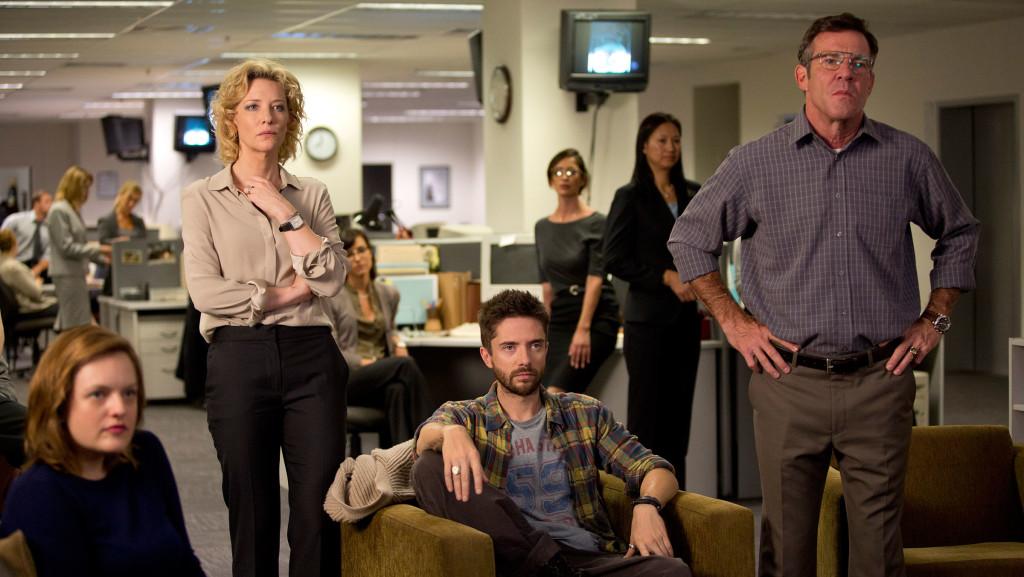The year is 2004. The place is New York City. A freelance researcher sits in the reception area of a modern office building, engaged in a conversation with a middle-aged man. “Why did you get into journalism?” the researcher asks.
The man contemplates the question for a brief moment and replies, “Curiosity. Why’d you get into it?”
The researcher responds simply yet pointedly: “You.”
In his feature directorial debut, “Truth,” screenwriter James Vanderbilt creates a story that keeps viewers intrigued with a compelling premise and stellar central cast but unfortunately falls short of its full storytelling potential due to uneven pacing and an underdeveloped narrative.
Adapted from the 2005 memoir “Truth and Duty: The Press, the President, and the Privilege of Power,” the film stars two-time Academy Award winner Cate Blanchett as Mary Mapes, a CBS News producer who works alongside eminent national news anchor Dan Rather (Robert Redford) on the primetime news program “60 Minutes Wednesday.” When a retired lieutenant colonel makes allegations that President George W. Bush shirked his duty during his time as a pilot in the Texas Air National Guard, Mary scrambles to pull together what promises to be the biggest story of her career only to find herself and her team in the line of fire after a stunning revelation threatens to destroy their careers — and their lives — forever.
Vanderbilt is no stranger when it comes to writing journalistic procedurals, his most well-known work being the screenplay for David Fincher’s “Zodiac,” which reenacted one of the most infamous cold cases in criminal history. But unlike his past success, “Truth” fails to shatter expectations, instead relying on textbook approaches for the first two-thirds of the film. Despite constant attempts to keep viewers in suspense, the exposition-heavy action only succeeds in distracting them from the movie’s main purpose and leaving them with questions that are never completely answered. At times, it almost feels as if Vanderbilt was too preoccupied with filming a tragedy instead of a political docudrama and, in doing so, lost sight of what really matters.
Even after all of the aforementioned criticisms, “Truth” manages to function primarily due to its leading lady. Blanchett, whose career has been filled with an array of colorful characters ranging from Elizabeth I in Shekhar Kapur’s “Elizabeth” to Lady Tremaine in Kenneth Branagh’s “Cinderella,” portrays Mary with such determination and vulnerability that she manages to transform into the character she’s playing. Everything she says or does feels honest and, with the exception of a distracting subplot involving her physically abusive father, nothing feels shoehorned in.
Opposite Blanchett is Redford, who manages to capture Dan’s larger-than-life persona despite an awkwardly portrayed bond with Mary and a sluggish transition. It isn’t until the final act that he shines through the underwritten script and captivates the audience with a gripping reenactment of Dan’s final broadcast.
The members of the supporting cast, unfortunately, fail to impress and come across as plot devices instead of characters. Topher Grace is unimpressive as Mike Smith, whose constant whining makes him come across as a young liberal, eager to “stick it to the man” rather than a fresh-faced professional reporter. Former “Mad Men” star Elisabeth Moss, who portrays journalism professor Lucy Scott, is underused and left with little to do or say. Dennis Quaid is equally underutilized as Lt. Col. Roger Charles, a military consultant whose role is largely limited to compiling lists of sources and letting other people know when situations go from bad to worse. Had Vanderbilt chosen to not take the easy way out, the final product could have been more enjoyable.
The overabundance of tried-and-true tropes, ranging from heated phone calls and Chinese takeout deliveries to overly theatrical monologues revolving around poorly constructed arguments, detract from the plot in such a way that viewers quickly grow tired of the already-portentous technique. It almost feels as though someone crammed them in at the last minute and didn’t bother to consider how they would overshadow the main premise.
The only other compliment one can give is a scene during the film’s final act, where Dan signs off for the last time with the word “courage” — a word he briefly used during his early days as an anchor — while paying tribute to the victims of Sept. 11, 2001, and the journalists who show that “reporting the truth [sometimes] means risking all.” This one scene not only showcases what it means to be a reporter but emphasizes the underlying message that is sadly lost in a whirlwind of caricatures and cliches.
As easily forgettable as it is moving, “Truth” provides viewers with a surface-level account of a controversy that forever changed the world of professional journalism.














